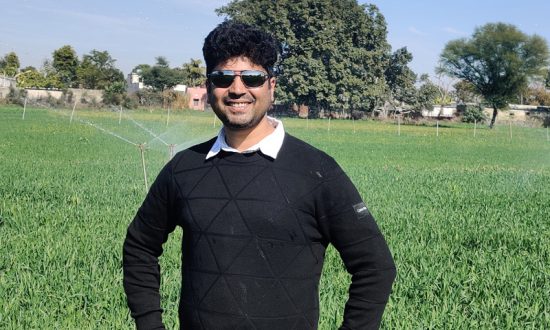Rajesh Ranjan has been an entrepreneur since his IIT Kharagpur days. The Bihar boy, who hails from a farming family, founded Krishify first-of-its-kind social and professional networking platform to help them. The app is for farmers and other stakeholders of the agricultural ecosystem like sellers, traders, even lending companies, distributors, farm input manufacturers. His idea is to create one single platform where all these stakeholders can come together and connect with each other, interact with each other and solve their problems.
Agriculture processes in India are a mix of traditional and mechanized practices. But the world is transforming at a breakneck speed, and the agricultural sector, too, needs to keep in step with emerging technologies to command the growth it deserves. In these transformational times, it is fortunate that India is home to the world’s third-largest start-up ecosystem (41k+ start-ups as per the Economic Survey 2020-21), more than 1000 of which are dedicated to the agriculture sector and are rightly termed as ‘Agri-tech start-ups.’ Most agri-tech enterprises are blending the expertise of modern technologies to empower the sector, including the small and medium farmers.
Though ‘Agri-tech is a broad term, in simple words, it is an ecosystem of businesses that use modern-day information technology to deliver products or services to farmers that help them to improve their overall performance and profitability across the value chain of agriculture. Agri-tech start-ups create end-to-end technology-enabled integrated value chains that include production, processing, and distribution, resulting in improved scalability, traceability, and transparency in the agri-value chain.
Different start-ups in the agricultural ecosystem working on varied fronts bring in different and a wide variety of capabilities for the farmers.
Technological advancements are transforming agriculture on multiple levels, such as automated machinery, AI-enabled planting and weeding, automated irrigation, and harvesting. AI also works in areas such as soil testing and analysis, predicting suitable environments for crop safety. Technology-enabled social platforms and e-markets enable farmers to connect, interact and conduct digital trading. Such enterprises have been helping farmers of all levels to grow, know new things, get solutions to various problems and learn new ways to perform their work.
Empowering Small and Medium farmers
Connectivity and Networking: One of the most significant ways agri-tech platforms, mediums, and enterprises enable farmers of all sizes is by increasing their network circle. No longer are farmers restricted by their geography and the limited knowledge contained within it. Farmers can connect with other farmers and stakeholders in the ecosystem spread across the country. They can leverage each other’s knowledge, experiences, problem-solving skills, crop solution, and crop rotation matrices for immediate and long-term benefits.
The agri-tech start-ups have also widened the connectivity of all farmers. Local mandi is no longer the endpoint of a farmer’s ambition. The agri-tech experts have brought in the options of direct digital trading and e-mandis to the farmers. This has eased up farmers’ local dependencies for farm inputs, cattle procurement, and sale, and produce sales.
Cost and Ease of use: The smartphone adoption and internet penetration in the hinterlands of India is a huge factor in the farmers’ ability to leverage beneficial digital technologies. Start-ups take care that all systems designed to be used in this sector are easy to use and are cost-effective vis-à-vis traditional processes. In local languages, apps and digital platforms have made the internet-enabled smartphone the handiest and effective tool in agriculture today.
Empowered decision-making: Agri-tech mediums have enabled the farmer to directly connect with the consumer and suppliers and thus eliminate the need for mediators to buy inputs or sell their produce. This way, farmers can make their own decisions and also derive the best cost and earning benefits.
Other stakeholders: We also must keep in mind that the agriculture sector doesn’t comprise farmers alone. It includes the non-farming stakeholders who need assistance, reach, and connections to farmers and other end-users, which the agri-tech help them with.
Agri-techs are playing a pivotal role in gradually reshaping the face of the agriculture sector by making resources available, exhibiting how to use resources wisely, distributing collective knowledge widely, and bringing the world closer to farmers through technology.
Role of agri-techs helping farmers in the pandemic induced crisis:
Like all other sectors, the negative impact of pandemic and lockdowns has been closely and widely felt in the agricultural sector also. The freezing of food supply chains, the struggle to buy inputs and sell produce, limited access to mandis, and stalled transport systems created massive panic and turmoil in the sector. Here too, the agri-tech start-ups came to the rescue of the ecosystem enabled by their swift reach and eager adoption of the facilities by the farmers. Many processes earlier deemed possible only physically are now being given a chance to be handled digitally through mobile phones.
Features like contactless buying and selling of commodities were the need of the hour, and the pandemic created an urgency for farmers as well as non-farmers to shift to technological and digital assistance not only for profit but also for health safety. The farmers also signed in to platforms that enabled them to connect with peers and experts from the safety of their homes yet find solutions to their problems or seek the right advice. Some agri-tech start-ups are reporting a 50%-100% surge in user base since the pandemic set in.
Usage of agri-tech platforms has led to many benefits for small and medium farmers, like higher crop productivity, better crop health, quick resolutions of problems, better access to finance, and a wider reach.
In the near future, we expect to see services like financial management, precision agriculture, and farm management also being added to the repertoire of offerings from agri-techs for small and medium farmers.


